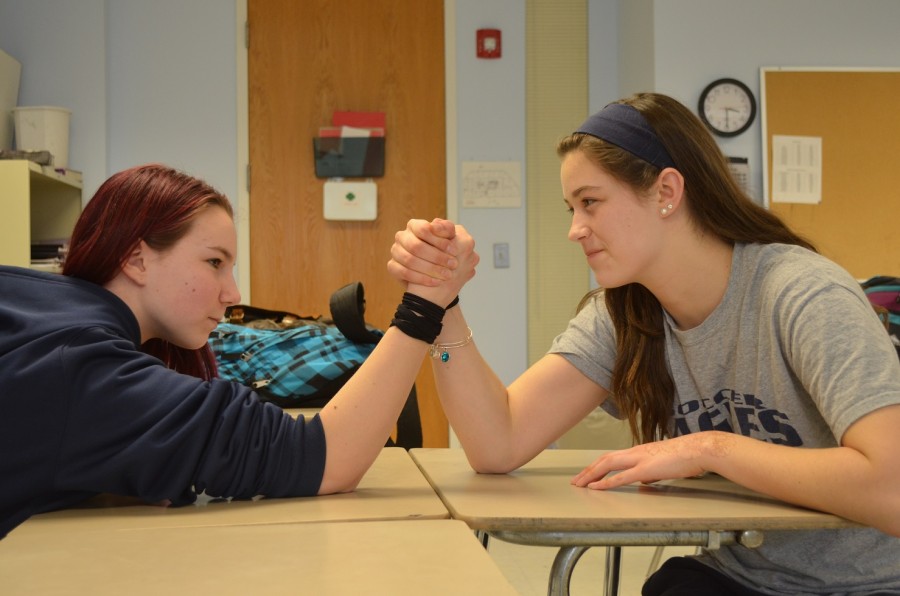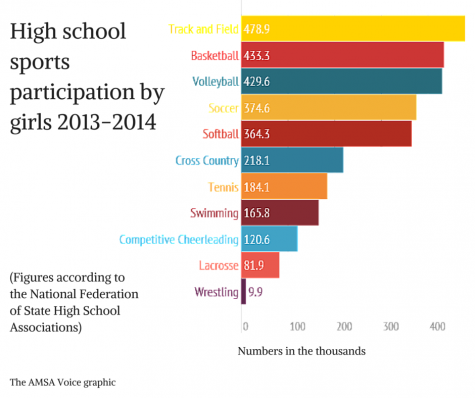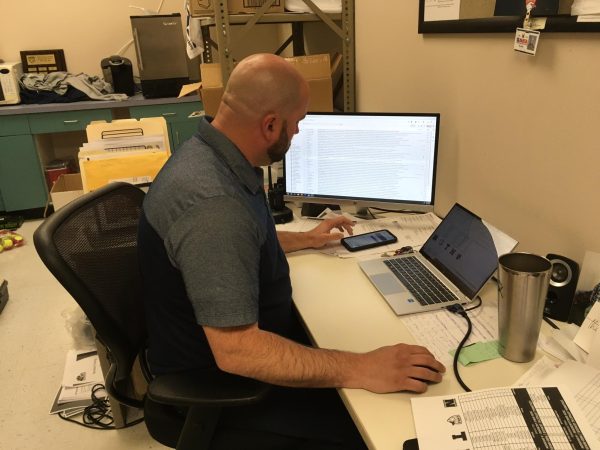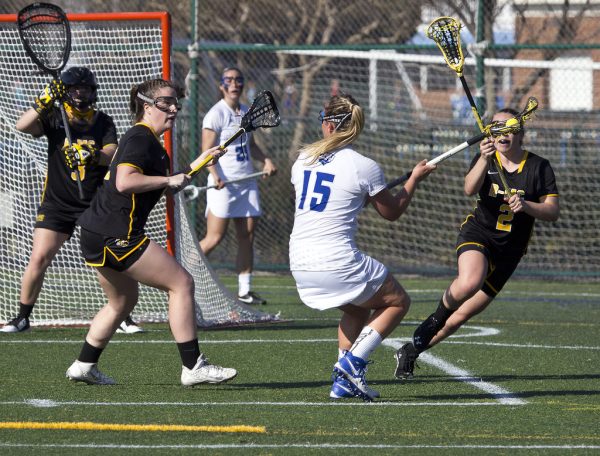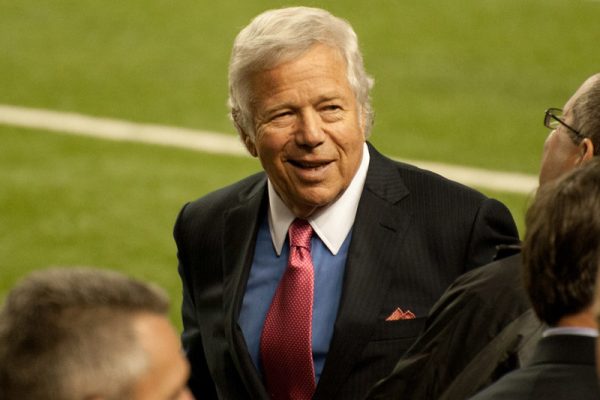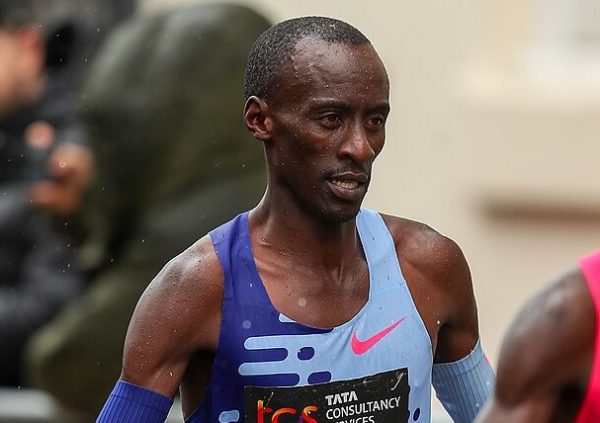Two AMSA wrestlers defy gender stereotypes
The mat is no longer a boys-only domain
Kelsey Mallard, left, and Danielle Newberry decided to join the wrestling team this season.
A spandex singlet clings to her body in a not-so-flattering way as she shakes hands with her opponent and tries to remain confident. She’s a high school girl and a boy is about to grab her all over.
She feels the blood rush to her cheeks and weeks of preparation start to seem useless as this muscular male stands in front of her. Doubt creeps into her mind; she knows her fate will be resolved in a few highly intense moments.
This was the routine for Kelsey Mallard, a freshman who competed this season for AMSA’s wrestling team, and if it all seems a little awkward, well, it was a little awkward.
“I was worried about what [the boys] thought of me,” Kelsey said. “And it was a fear of getting killed.”
There is little doubt that most high school females would cringe, sweat, blush, or quiver (perhaps all of the above) at the thought of joining a wrestling team, requiring them to engage physically with the opposite sex in a way that is unusual, to say the least.
It doesn’t fit the stereotype of teen interaction—inside or outside the athletic realm.
But Kelsey and another underclassman, sophomore Danielle Newberry, defied stereotypical gender roles on a daily basis in one of the most male-dominated and testosterone-charged of sports.
They competed for AMSA during a 9-10 campaign in which two Eagles wrestlers, Aaron Linz (152 pounds) and Juan Zabalu (195 pounds), qualified for the Division 3 State Tournament.
The decision by the girls to join the wrestling squad left coaches impressed, boys conflicted, and athletic directors hopeful about what wrestling will mean for the future of the school.
“On our team, I’m treated like just one of the guys,” Kelsey said.
Perhaps Matt Schiller, an AMSA physical education teacher and their primary wrestling coach, said it best: “They all suffer equally.”
It is this type of mentality that gives equal opportunities to every wrestler on the team. Mr. Schiller made it clear from the beginning of the season that the girls should not be treated differently.
“I had two boys approach me at the beginning of the year and say they were uncomfortable with wrestling girls,” he said. “I told them to suck it up or quit.”
Mr. Schiller believes that although the two females may have made male wrestlers on opposing teams uncomfortable, he did not see that mentality in boys on AMSA’s team by season’s end.
“The people that have the hardest time with [wrestling females] are the ones who are new to the sport,” Mr. Schiller said. “For people with experience, it’s not a weird thing.”
Jared Huie, an AMSA freshman, explained that his mentality had to evolve during the regular season, which ended on Feb. 13.
“It was a little bit awkward but I got over it. Now it doesn’t bother me,” Jared said.
George Albuquerque, AMSA’s athletic director, believes that the boys have learned a valuable lesson.
“It’s natural to be uncomfortable,” he said. “But you have to put that aside and worry about the sport.”
Mr. Albuquerque thinks that female enrollment is empowering. In fact, he wants to pursue organizing a female wrestling team at AMSA in the future.
“It takes a lot of courage to go against the grain,” he said. “We could start a female wrestling team if we get a higher number of females to sign up to fill the weight classes.”
Even with positive reinforcement from individuals such as Mr. Albuquerque, there are still several stereotypes associated with females who wrestle. Mr. Schiller is well aware of the popular “lose-lose stigmatism.”
“If you beat her, you beat a girl,” he said. “And if you lose, then you lost to a girl.”
Kelsey said that none of that should matter.
“I wish they would treat me as one of the guys,” she said.
Kelsey is no ordinary athlete, either—she has a background in both jujitsu and martial arts and really enjoys the collaborative aspects of wrestling.
“It’s one-on-one but it’s also a team,” Kelsey said. “You’re the only one in your match but [how you do] still matters for the entire team.”
For Kelsey, the key to being a female wrestler is maintaining confidence before a match, in those moments when opponents stare at each other, measure each other, and doubt threatens to overwhelm the mind.
“The hardest part is not getting psyched out and thinking ‘he’s going to crush me,’” she said.
And she’s thankful that the boys adapted to having female members on the team.
“I don’t think boys are weirded out [anymore],” she said.
Danielle, meanwhile, hasn’t always been well received by her opponents—males who are unprepared to wrestle girls.
“If they don’t want to wrestle me that’s their personal problem,” Danielle said, referring to boys who would rather forfeit matches than get out on the mat and wrestle her.
It has all combined to serve as an important life lesson.
“You have to get over the fact that you are going to lose,” Danielle said. “You have to stay positive.”
While Kelsey plans on wrestling for the remainder of high school, Danielle is unsure.
“I liked it, but I’m not sure about winter sports,” Danielle said.
Regardless of any future involvement in the sport, both girls made notable contributions to the team by showing how empowered females can be passionate and hardworking in a sport that is dominated by boys.
“Going out on a match and getting your hand raised makes it all worth it,” Mr. Schiller said.
Regardless of sex, of course.

Alli Caulfield is a co-editor of The AMSA Voice. She is a senior and a resident of Leominster. She hopes to attend college in a big city to pursue her...


